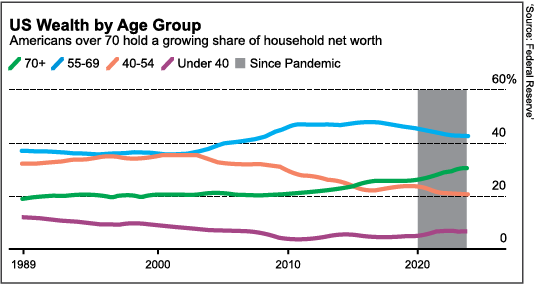Fique por dentro das novidades
Inscreva-se em nossa newsletter para receber atualizações sobre novas resoluções, dicas de estudo e informações que vão fazer a diferença na sua preparação!
Questão ativa
Já visualizadas
Não visualizadas
Resolução pendente
Questão anulada
Sem alternativas

Leia o texto e examine o gráfico para responder às questões de 11 a 17.
Most don’t work anymore, but Americans age 70 and older have seen their share of collective wealth surge during the pandemic. As a group, they have accumulated more than $14 trillion in additional net worth since the end 2019, based on Federal Reserve data. Their share of the country’s wealth has jumped to a record 30%, even though they account for 11% of the population.

The aging population helps explain some of the gains: there are about 2.3 million more people over 70 in the country than in 2019. But one major driver was the surge in home values and stocks during the pandemic, which benefited older generations most likely to own a house — or two — and hold equities or mutual funds.
Although people who are over 70 are typically retired, a rising portion of that age group is still working. The share of adults age 65 and more in the labor force reached a historic low of 10% in the mid-1980s but has since almost doubled, even after many retired early at the onset of the covid-19 health crisis.
Older Americans also have been the beneficiaries of good timing with the stock market, despite recessions along the way. Since 2019, those age 70 and older have collectively gained about $5 trillion in equity gains. Close to 38% of the nation’s corporate equities and mutual fund shares were held by people in that age group, the highest share on record in data going back to 1989.
(Alex Tanzi. www.bnnbloomberg.ca, 2023. Adaptado.)
In the excerpt from the second paragraph “there are about 2.3 million more people over 70 in the country”, the underlined word can be replaced, without meaning change, by
luckily.
roughly.
undeniably.
barely.
actually.
A questão 14 pergunta qual das alternativas possui uma palavra que pode substituir a expressão “about” sem mudança no significado da frase. Como “about” significa “sobre” em Língua Portuguesa, a opção mais correta é a da alternativa B, “roughly”, que significa “aproximadamente” em Português. As alternativas A, “luckily” – felizmente, C, “undeniably” – inegavelmente, D, “barely” – escassamente e E, “actually” – de fato, mudariam o contexto da sentença.
Inscreva-se em nossa newsletter para receber atualizações sobre novas resoluções, dicas de estudo e informações que vão fazer a diferença na sua preparação!